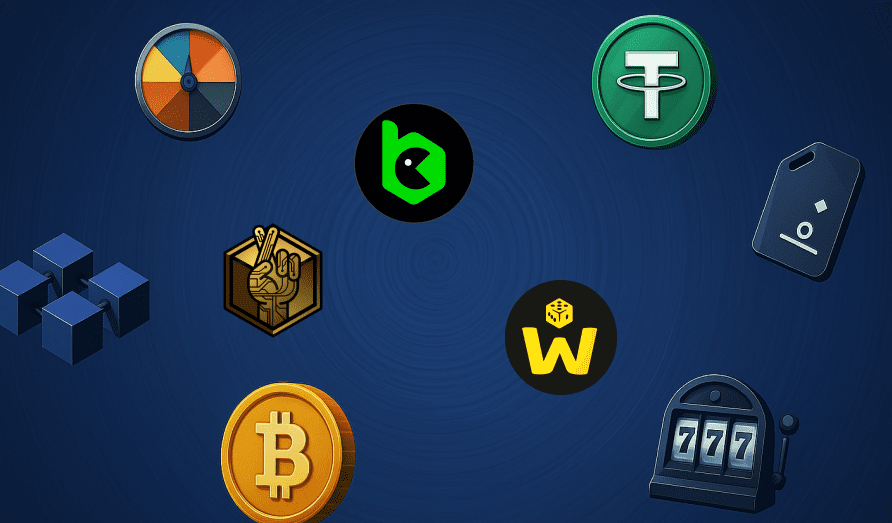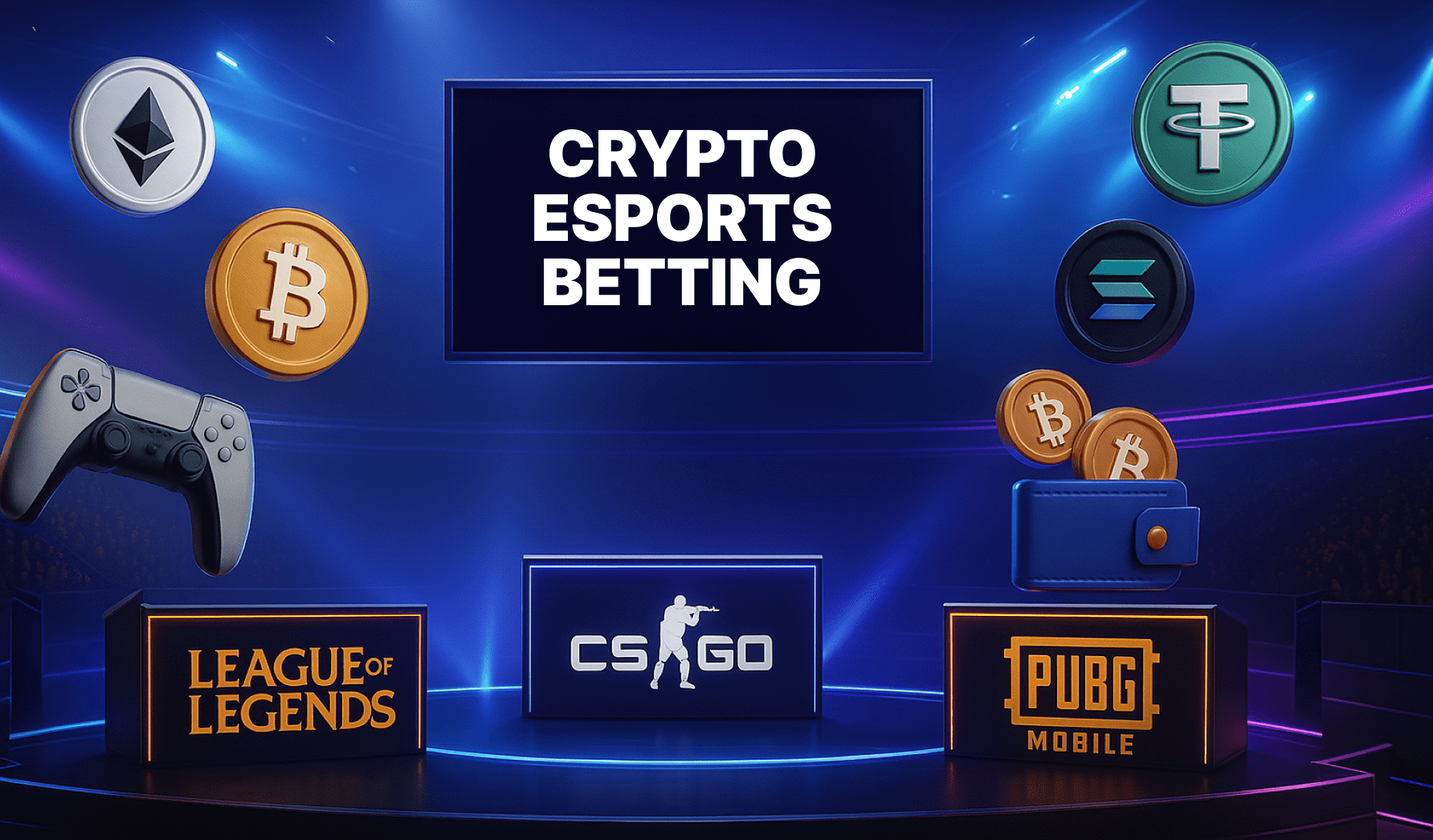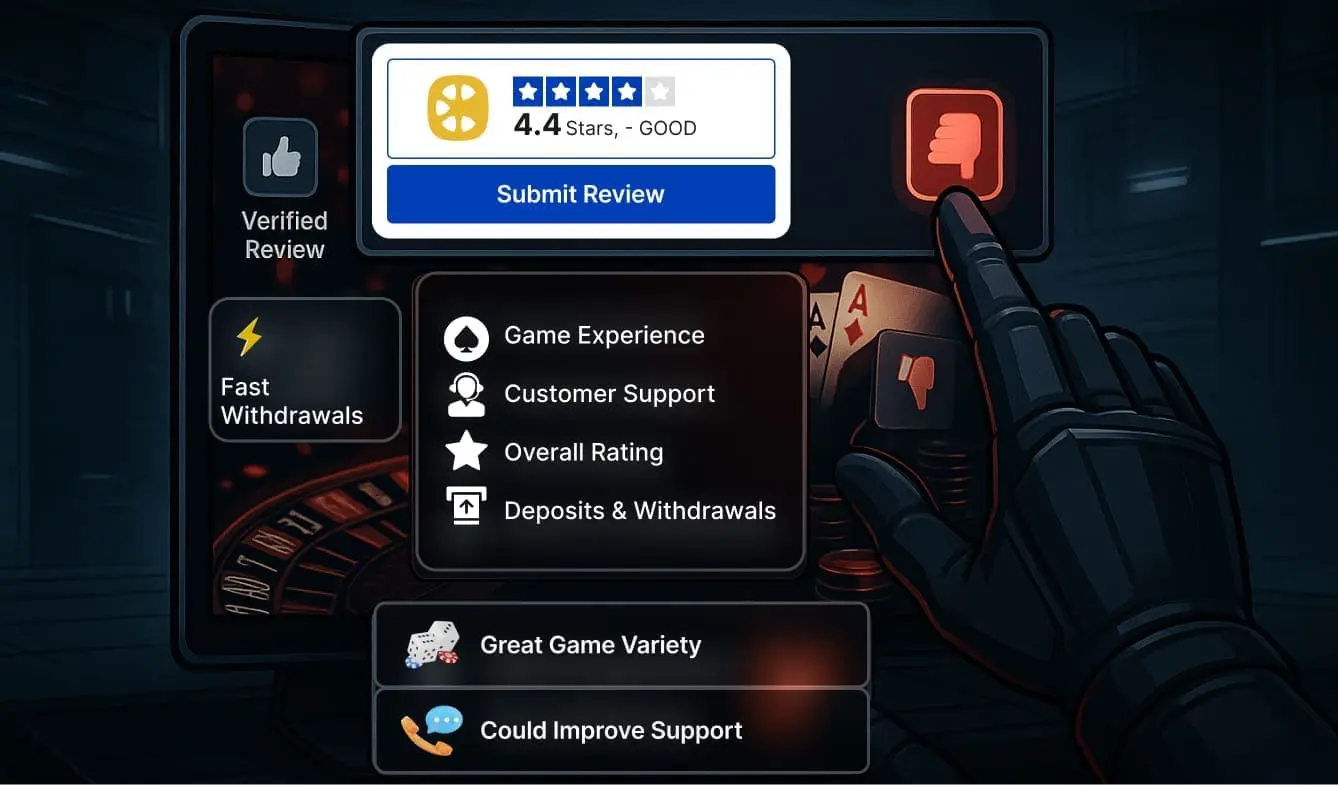
How Crypto Tokens are Revolutionizing Rewards and Payouts
In this original CoinBets.com article, we’re going to look at the core principles of tokenomics and how they relate to the crypto gambling space.
We’ll look at specific platforms that have successfully integrated crypto tokenomics, and highlight the particular successes and challenges they faced. Additionally, we’ll consider the future of tokenomics in gambling, and discuss potential regulatory hurdles, market risks, and emerging trends.
Traditional Rewards and Payout Systems
But, before we get to tokenomics, let’s look at where most online gambling platforms stand right now, i.e. using traditional rewards and payout systems.
Digitized Versions of Land-Based Systems
The online casino and sports betting industry has long used conventional fiat-based reward and payout systems. Essentially, they are digitized versions of those used at land-based casinos and betting shops.
When a player wins, the funds are credited to their accounts as dollars, euros, pounds, or another fiat currency. They can then be withdrawn to a bank, card, or e-wallet account. Rewards usually come in the form of comp points, bonuses, and other conventional incentives aimed at increasing engagement and player retention.
However, as any casino player or operator will know, such systems are far from ideal. High transaction fees, slow withdrawal processes, and limited transparency often lead to frustration among players.
Friction and Trust Issues
Unfortunately, these issues are being worsened by intrusive KYC (Know Your Customer) regulations. For example, a quick look at casino reviews on the popular review site Trustpilot shows an increasing level of frustration among players regarding identity verification processes.
Also, the centralized nature of traditional online casinos and sportsbooks means players are forced to put a high degree of trust in operators. This is even the case for those licensed by strict regulators like the UK Gambling Commission (UKGC) and Malta Gaming Authority (MGA).
In the case of disputes, it can be difficult for players to achieve satisfactory resolutions. Plus, from the other side of the fence, operators are constantly fighting against fraud and bonus abuse.
Blockchain and Crypto Tokens Offer a New Way Forward
The advent of blockchain technology and cryptocurrencies has sparked an ongoing transformation in the online gambling industry. Crypto tokens are now being integrated into online gambling platforms, allowing an entirely new approach to both rewards and payouts.
Underpinned by the principles of tokenomics, these digital assets are improving efficiency and providing new opportunities for both gambling operators and players. Indeed, the integration of crypto tokens into gambling platforms is driving a fundamental shift in how value is created, distributed, and managed within these ecosystems.
For example, the use of blockchain technology can ensure real transparency, immutability, and fairness — as demonstrated by provably fair games. Meanwhile, crypto tokens allow for entirely new betting mechanics, loyalty programs, and payout structures.
Understanding Tokenomics
Before we get to how blockchain and crypto tokens are impacting the online gambling industry specifically, it’s important to understand the basic principles of tokenomics.
What is Tokenomics?
Tokenomics is a simple portmanteau of the words “token” and “economics,” and refers to the economic structure and design principles of a cryptocurrency or digital token.
So, that’s how the tokens are created, distributed, and used within an ecosystem, along with the incentives to drive participation within that system. These systems are governed by smart contracts and protocol architecture
In a nutshell, tokenomics is the study of how value is generated and exchanged within a blockchain network.
Getting tokenomics right is important for any blockchain-based project because it directly determines the engagement and behavior of participants. Hence, the sustainability and success of the entire ecosystem depends on it. This is true whether it’s a gambling platform, a massively multiplayer online role-playing game, a DeFi project, or anything else.
Components of Tokenomics
There are five key elements of tokenomics — each one playing an important role in the functioning of a blockchain ecosystem.
- Token Supply: The total number of tokens that can ever be created. It includes both the circulating supply and those still to be minted. Scarcity can have a significant impact on the token price.
- Distribution Mechanisms: How tokens are initially and subsequently distributed and circulated within the project ecosystem. Methods can include things like Initial Coin Offerings (ICOs), airdrops, staking rewards, and mining. Accessible and fair distribution mechanisms are vital to encourage participation in a project.
- Utility: This refers to what it does, or its primary function within the ecosystem. For example, when it comes to gambling platforms, they may be used to place bets, participate in games, earn rewards, or gain access to specific features. Utility can significantly affect demand, and hence market value.
- Incentive Structures: For a project to gain traction and grow sustainably, people must be convinced to engage and behave in desired ways. Examples include rewarding participants for their loyalty, offering bonuses for referrals, and creating staking opportunities to help secure the network.
- Governance: DeFi (Decentralized Finance) projects and DAO (Decentralized Autonomous Organizations) often issue tokens that provide holders with certain voting rights in decision-making processes. This can help build trust and a sense of ownership among the community.
Core Components of Gambling Tokenomics
Token holders vote on changes, creating community trust
Controls scarcity, inflation, and long-term value
How tokens are allocated to users, investors, and team
Motivates player activity, staking, and loyalty
Tokens must actually do something — not just sit
Advantages of Tokenomics in Gambling
Compared to traditional systems, the integration of tokenomics into gambling platforms offers several compelling advantages:
- Transparency: Because all transactions and token movements are recorded on immutable public ledgers, blockchain-based systems reduce the risk of fraud and increase player trust.
- Lower Transaction Costs: Crypto tokens enable peer-to-peer transactions, significantly reducing costs for both operators and players.
- Faster Payouts: Crypto token transactions can be virtually instant and aren’t restricted to bank business hours.
- Stability: Gambling is classed as a “high-risk” industry, so third-party payment providers, like banks, often withdraw services at short notice. Some card issuers also block gambling transactions. Peer-to-peer crypto transactions avoid these problems.
- Enhanced User Engagement: Gambling platforms can create more engaging experiences for players by incorporating tokens into reward systems and betting mechanics. For example, they can be used to unlock special features, exclusive games, or higher rewards.
From Theory to Reality: Tokenomics in Action
• Buyback & burn data is public
• Revenues fully tracked on-chain
• Peer-to-peer betting—no middlemen, no banks
• Instant crypto withdrawals via SHFL
• Weekly buybacks fuel a self-sustaining ecosystem
• VIP perks + early access for SHFL holders
• Games run on-chain with DAO voting
• No centralized fees—fully decentralized ops
• Instant payouts via automated liquidity vaults
• DAO treasury ensures long-term sustainability
• Developers earn from launches
• Players share in platform revenue
Application of Tokenomics in Gambling Platforms
Now that we’ve covered the basic principles of tokenomics, let’s look at how they are actually being applied by online gambling platforms.
New Betting Mechanics and Features
On traditional gambling platforms, bets are usually placed using fiat currencies, with predetermined odds set by the house. However, smart contracts and crypto tokens have enabled entirely new formats and possibilities.
Dynamic, Real-Time, Custom Betting
For example, some platforms allow players to place bets directly in specific cryptocurrencies, each with different odds and potential payouts. Plus, some platforms now use decentralized oracles to set dynamic odds based on real-time data, creating a fairer, more responsive betting environment.
Tokens also make social betting platforms possible. These allow players to create and participate in custom betting events, where they can set odds and rules.
Pooled Betting
Tokens can also be used to enable pooled betting. This allows players to combine tokens to place a collective bet. Any winnings are automatically distributed proportionally based on each player’s contribution.
For example, a live streamer can play a specific slot, and viewers have the option to join in with the betting. In addition to increasing potential payouts, this also helps build a sense of community among players on the platform, further increasing loyalty and retention.
Rewards and Loyalty Programs
Tokenomics is also revolutionizing how crypto casinos and sportsbooks reward their users. Instead of earning comp points that can only be redeemed for on-platform perks or free spins, crypto tokens offer far more flexibility.
More Features, More Value
For example, crypto tokens earned as rewards for gameplay can also be traded on external exchanges or used in other crypto-enabled services. This provides a level of liquidity and value to rewards that far exceed anything offered by traditional comp points.
Using crypto rewards in online casinos and sportsbooks also makes it easier to create extensive, feature-rich tiered loyalty and VIP programs. These enable players to access exclusive features, games, or events based on the number of tokens they hold or have wagered. These can be especially useful for retaining high-value players.
NFTs
Beyond standard crypto tokens, some gambling platforms have also been experimenting with using Non-Fungible Tokens (NFTs) in their loyalty programs. NFTs are digital tokens that can’t be divided and represent a unique digital asset.
These can be awarded to players as special rewards, granting access to unique experiences, digital collectibles (like at MetaWin), or in-game items. And, again, because these NFTs can be traded or sold on third-party marketplaces, they add additional layers of value to the rewards ecosystem of a platform.
Payout Structures
The payout process is one of the most critical aspects of the online gambling experience. Unfortunately, reliance on third parties like card processors and banks, means traditional payout systems often suffer from delays, high fees, and withdrawal limits.
This is why slow payouts are one of the biggest causes of complaints from players on review sites. Hence, fast, low-friction, low-cost payouts via crypto tokens in gambling are one of the most compelling benefits of tokenization.
Directly from Wallet to Wallet
Payouts made using crypto tokens can be transferred directly between the platform and players, without any third-party intermediaries. This means they can be processed almost instantly and at a very low cost (depending on the specific blockchain used — Ethereum, we’re looking at you).
This is a win-win situation, improving user experience and reducing costs for the operator.
New Payout Options
Adopting tokenomics at online casinos and sportsbooks allows payouts to be structured in new ways.
For example, a platform can give players the choice of receiving winnings in different cryptocurrencies or offer staking rewards. The latter gives players the option to reinvest some of their winnings in the platform’s ecosystem, generating a passive income of more tokens.
Enhanced Transparency and Trust
Additionally, using crypto tokens in gambling allows for more transparent and verifiable payout processes.
Because all transactions are recorded on a public blockchain, players can easily verify if their winnings have been paid correctly — building even more trust and loyalty.
Traditional vs Crypto Gambling Payouts:
Why Speed (and Fees) Matter
Traditional Gambling (Fiat)
🪪 High Fees, Long Delays
Crypto Gambling (Blockchain)
⚡Low Fees, Instant Payouts
Player Requests Withdrawal
Player requests crypto withdrawal
Payment processor gets involved
1-3 business days
Direct blockchain transaction
~10 minutes
Bank reviews and approves
add 2-5 business days
Funds arrive in player’s wallet same day
Total time: Minutes, not days
Player finally gets the funds
Total time: Up to a week or more
Case Studies: Gambling Tokenomics Trailblazers
Many crypto casinos now have native tokens, but lets take a look at some of the early projects, and the lessons learned
TG.Casino
Billing itself as the “World’s #1 Telegram Casino”, TG Casino can be accessed via its website or completely anonymously via the popular Telegram app.
Players betting with its native TGC token earn 25% cash back on all bets, and can also earn revenue-based staking rewards. The $5 million pre-sale of TGC sold out and the network launched on January 24, 2024.
The casino also issued special High Roller NFTs which give holders even more perks. These included staked tokens bonuses from buybacks, casino credits, rakeback on the house edge every week, and seasonal rewards.
Although TG.Casino itself has been operating successfully as a standard crypto casino for some time, it’s too early to tell whether its tokenomics model will be sustainable. The casino pitches itself directly against major crypto casino competitors like Stake, Roobet and BC Game, and could act as something of a barometer for the wider industry.
However, the site could potentially run into headwinds in the very near future, particularly because of its association with Telegram — a platform that is itself under intense pressure due to its determination to protect user privacy.

 : TGC Token & High Roller NFT Perks
: TGC Token & High Roller NFT Perks
💸 $5 Million
TGC Token Pre-Sale
✅ Sold Out Pre-Launch
Launch: Jan 24, 2024
🎁 25% Cashback with TGC
Use TGC for bets → Get 25% back
Bet $1,000 → Get $250 back
🏆 VIP NFT Utility
10% rakeback weekly (e.g., $50 back on $500 edge)
Bonus staking rewards from buybacks
Seasonal airdrops & exclusive credits
🎯 Chasing the Giants
Competing with Stake, Roobet, BC.Game
Regulatory Risk: Telegram ties may trigger scrutiny
FunFair (FUN Token)
A decentralized gambling platform built on the Ethereum network, FunFair is focused on providing players with provably fair gaming experiences.
At the heart of FunFair’s ecosystem is its native FUN token, which is used for all transactions on the platform, including placing bets, paying for services, and receiving rewards.
The platform’s tokenomics model is designed to be deflationary. A small percentage of each transaction fee is burned, continually reducing the overall supply of FUN tokens over time. This creates upward pressure on its value as demand increases (theoretically, at least).
Additionally, the FunFair platform also offers users unique reward mechanisms, including staking opportunities. This offers participants the chance to earn additional rewards for staking FUN tokens and helping to secure the network. At the same time it increases engagement, loyalty, and sustainability.
Although FunFair proved the technical viability of tokenization in online gambling, it has increasingly moved away from the space, pivoting towards general gaming in the metaverse. This has largely been due to regulatory challenges, which we’ll explore in depth later on.

FUN Token: Fueling Decentralized Gambling
One Token, Total Control
Use FUN for bets, rewards, payments — all in one place.
Burn = Boost
Fewer tokens in supply = higher long-term value for holders.
Earn While You Wait
Stake FUN to earn passive income as you play.
Edgeless (EDG Token)
Another blockchain-based gambling platform that has successfully implemented tokenomics is the online casino Edgeless. The USP of the site is referenced in its name — there’s a 0% house edge. This means there’s no advantage to the house, so players have a genuinely fair chance of winning.
The native token of Edgeless is the EDG token. Again, this is used for all transactions on the platform, including placing bets and payouts. Edgeless is completely transparent, using smart contracts to verify all transactions, so players can check payouts are accurate.
The platform also runs a loyalty program allowing players to earn EDG tokens based on their activity. The EDG tokens earned can be used to access exclusive games, features, and special events, enhancing the player experience and loyalty.
Although the Edegless website has proven the concept of tokenomics at an online casino, the project seems to have been on a hiatus for the past couple of years. Again, this is no doubt due to the repressive regulatory environment.

0% House Edge. 100% Player Power.
0% House Edge
Unbiased odds. No house advantage.
Smart Contract Verified
All transactions are public, traceable, and provable.
EDG Loyalty Rewards
Top players earn tokens through consistent play.
Wagerr (WGR Token)
This decentralized blockchain-based sports betting platform uses its native token, WGR, for all bets and payouts.
To help ensure the long-term sustainability of the platform, a small fee is charged with each bet. A portion of each fee is burned, to create deflationary pressure on the overall WGR token supply, and help maintain the token’s value.
However, Wagerr takes things further, giving player the opportunity to engage in peer-to-peer and event-based betting. This allows players to create their own betting events using WGR tokens, taking engagement to a whole new level.
Again, despite proving itself and gaining a loyal following, the exact current status of the Wagerr project is unclear, with no social media posts for some time, and the website saying Wagerr V.5 is coming soon.
Lessons Learned
Gambling operators considering implementing tokenomics on their platforms can learn several key lessons from these early leaders.
- Transparency is Key: The transparency offered by blockchain-based smart contracts and decentralized ledgers, is very effective at building trust with users
- Incentivize Engagement: Cypto tokens and NFTs, can provide real utility and value to players. This is far better for encouraging long-term loyalty and engagement than traditional reward systems.
- Manage Token Supply Carefully: Avoiding rapid inflation or deflation is critical to maintaining stability. Mechanisms like burning and staking can be used to do this.
- Embrace Flexibility: Tokens gives operators the ability to be far more flexible in terms of betting formats, payout options, and reward structures. This is key to both attracting and retaining a diverse player base.
- Regulatory Uncertainty is a Significant Hurdle: Many of the early projects proved the technical viability of concepts, but ran into regulatory brick walls. Any new projects need to be aware of the uncertainties in this field.
Expert Opinions and Future Insights
We’ve seen some examples of crypto tokenomics in online casinos to date, but what does the future hold, and what are industry experts saying?
Andrew Carl, CTO of FunFair, stressed the need to combine anonymous transactions with verified identities in the gaming space, explaining:
“In the blockchain space, privacy and authentication are both crucial aspects. While they may seem like opposite sides of the same coin, individuals will likely need to utilize both anonymous transactions and authenticated identities. While this may not be directly related to GameFi, we can collaborate with our GameFi partners to help streamline access to privacy and authentication blockchains.”
Meanwhile, in May 2024, Steven Salz, CEO and Co-Founder of Rivalry, a gambling platform that recently announced the launch of its own crypto token, noted:
“Online gambling is the latest web-based consumer category being increasingly disrupted by blockchain technologies with greater speed, access and functionality than their legacy counterparts. Tech-savvy bettors are leading a behavioral shift towards more experiential and crypto-enabled gambling experiences that are taking wallet share from incumbents at an accelerated rate.”
And, in April 2024, Sim Harmon, CEO and Founder of social betting platform Kutt, pointed out the demand for tokenomics-based peer-to-peer social betting, saying:
“Betting has been a social activity for thousands of years, so it’s no surprise that consumers want the ability to facilitate and track wagers against their friends… If anything, bettors unquestionably prefer a more curated, social experience — they want to be part of a wider community and to be part of the conversation around sports, entertainment, and important events.”
Predictions: The Future of Tokenomics in Gambling
On the face of things, the future of tokenomics in the gambling sector seems bright, with several trends likely to continue.
1. Increased Decentralization
The accelerating adoption of blockchain and crypto in general will lead to more decentralization in the online gambling space. As more gambling platforms go on-chain, players will gain greater control over their funds and data. This will significantly reduce reliance on third-party intermediaries and build trust.
2. DeFi Integration
By integrating DeFi protocols, gambling platforms will expand their offerings to include financial products like lending, borrowing, and yield farming. This will continue to blur the lines between gambling and traditionally separate fields like trading and investment.
3. Regulatory Evolution and Pushback
As regulators become more familiar with blockchain technology, we can expect at least some of them to be more accommodating to token-based gambling platforms. This will catalyze innovation and the introduction of new products and services. However, we’ll also see some regulators pushback against decentralized technologies.
4. Stablecoin Adoption
As the use of stablecoins becomes more common for international financial transactions, coins like USDT and USDC may effectively replace the US dollar for online gambling.
5. Gamification and NFTs
The use of gamification and NFTs will continue to expand, with platforms offering more unique and engaging experiences for players. We should expect to see a host of new concepts.
What’s Next: 5 Predictions for Tokenized Gambling
More casinos go fully on-chain, giving players true ownership of funds, data, and outcomes.
DeFi meets dice. Casinos will plug into protocols for lending, yield, and liquidity – all inside the betting flow.
Regulators will adapt, but battles over decentralization and compliance are far from over.
Stablecoins will become the default for deposits, reducing volatility and simplifying risk.
From NFT loot to level-up mechanics – gamification will redefine how players bet and earn.
Challenges and Potential Issues
Tokenization may have proven itself in terms of improving efficiencies, guaranteeing transparency, and increasing engagement — but it’s not all plain sailing ahead. Several major challenges remain — especially in certain countries.
Like Oil and Water: Decentralized Tech and Centralized Regulators
One of the biggest challenges facing the adoption of tokenomics in online gambling is the complicated and uncertain regulatory landscape. Online gambling is already subject to a highly complicated patchwork of different regulations and laws, varying greatly from one jurisdiction to another.
The introduction of crypto tokens in online casinos and sportsbooks adds yet another layer of complexity. While some regulators have at least attempted to embrace the potential of blockchain technology, even then, things have often delivered less than stellar results.
A Warning from “Blockchain Island”
A case in point being Malta. This Mediterranean island nation has long been a hub of the online gambling (iGaming) industry, and in the late 2010s embarked on a mission to become ‘Blockchain Island’. However, by late 2024, the project had fizzled out and despite remaining an iGaming hub most Maltese-licensed casinos didn’t even accept crypto payments.
The Maltese experiment failed because regulators found that trying to dovetail existing centralized regulatory frameworks with new decentralized technologies is almost impossible. This was best illustrated by the fact that Binance, the world’s largest crypto exchange, was planning to relocate to Malta, but gave up because the licensing process took so long.
This case is particularly poignant because the Maltese government had been extremely enthusiastic about all things blockchain, crypto, and iGaming. Yet still, it failed to provide an efficient and effective regulatory framework. In other countries, with less amenable governments, the challenges are even more daunting.
UK and US Headaches
For example, despite the United Kingdom being a hub of blockchain innovation, the UKGC (UK Gambling Commission) has effectively banned licensees from even supporting crypto payments. Similarly, in the United States, the SEC (Securities and Exchange Commission) has been making life difficult for crypto businesses — even huge exchanges like Ripple, Coinbase and Kraken.
US sports and fantasy sports betting operator DraftKings found out just how difficult the space is too. In late July 2024, the platform announced it was shutting down its NFT marketplace following a class action lawsuit arguing the tokens were unregistered securities.
The DraftKings NFT marketplace has been live since 2021, offering sports-themed digital collectibles on the Polygon blockchain. Later, the platform also launched an NFT-based daily fantasy sports game called Reignmakers, which gave customers the ability to win more digital collectibles.
To assuage players who had already invested time and money in the NFTs, DraftKings has said it will buy back digital assets from Reignmakers players. All in all, a very costly experiment for the operator.
Crypto vs. Compliance: A System at War
Centralized Regulators
Slow, outdated, and tangled in red tape.
Decentralized Tech
Fast, transparent, and user-controlled.
Endless Paperwork
Transparent Ledger
Legal Roadblocks
Programmable Value
Unclear Rules
Full User Control
The Clash
Decentralized systems evolve fast. Regulators don’t. That gap is the real battle.
The KYC and AML Conundrum
Another roadblock for tokenized innovation is compliance with KYC (know your customer) and AML (anti-money laundering) rules.
Many argue that adhering to KYC and AML regulations is vital for the long-term sustainability of token-based gambling platforms. However, it’s hard to see how this will be possible.
The entire point of these laws is to ensure that centralized authorities know who is making every financial transaction — and where funds originated. This is fundamentally incompatible with the principles of privacy promised by decentralized tech like crypto.
If crypto casino players are forced to provide ID before they can gamble or withdraw, then there is no privacy. Likewise, if crypto transactions are analyzed by third parties, there is no true privacy. In fact, these may even reintroduce the delays and frustrations that crypto was intended to address in the first place.
Central Bank Digital Currencies
And things may be about to get even worse on this front. Many people suspect that governments are planning to introduce CBDCs (central bank digital currencies). These are digitized versions of existing fiat currencies like the dollar, euro, and pound. Although they will use blockchain technology, they will be highly centralized.
Worryingly, they will also be programmable, enabling the authorities to easily monitor and control all transactions. This means individual governments would be able to control the crypto-fiat onramps and offramps. For example, centralized exchanges.
Clearly, this could present major problems for the crypto gambling industry and its tokenization dreams.
KYC vs. Crypto Privacy: A Broken Fit
KYC laws want full identity checks. Crypto was built to avoid them. That friction isn’t going away.
🧾 Personal Data
Identity checks, bank verification, full user profiling.
🛡️ Anonymity & Autonomy
No names, no banks, just private, decentralized bets.
The Conflict That Won’t Go Away
Regulators demand control. Crypto rejects it. Until one bends, friction is the only guarantee.
Crypto Market and Scaling Risks
As we’ve seen many times, crypto is extremely volatile. This poses significant risks to both players and platform operators. For example, a sharp drop in the value of a gambling token could mean big losses for players and the drying up of liquidity, and thus functionality, of a platform.
However, compared with regulatory challenges, market risks are easier to address. For example, platforms (and players) can employ risk mitigation strategies, diversifying portfolios to include a variety of assets, including stable coins.
Something more difficult to address is the possibility that a project will simply fail to scale. If a platform’s native token doesn’t gain enough traction quickly enough, it can undermine its liquidity and cause a death spiral.
Unfortunately, because there are so many variables involved this risk is particularly hard to address. All any project can do is focus on building a strong community of users and partners, while giving their token as much utility as possible.
Final Thoughts about Tokenomics in Gambling
Blockchain tech and crypto tokens are already creating more engaging and rewarding experiences for players. At the same time, they are reducing operational costs and fostering trust between players and operators.
Despite this, we’re only at the dawn of the decentralized era. As the online gambling industry continues to evolve, the role of crypto tokens and NFTs will become more prominent. Players, operators, and developers will continue to drive innovation, including exciting new betting mechanics and improved rewards and payout structures.
For those interested in exploring the potential of token-based gambling platforms, now is the perfect time to dive in. Whether you’re a player, or an investor seeking to benefit from explosive growth, the integration of tokenomics in gambling offers virtually limitless possibilities.
The future is going to be interesting!
What do you think about tokenomics and gambling? Are you crazy for crypto or nutty about NFTs? Or do you think it’s mostly hot air and gimmicks? Let us know!
Join The Conversation
No comments yet. Be the first to comment!
 Continue with Apple
Continue with Apple Continue with Google
Continue with Google


Comments (0)
Share